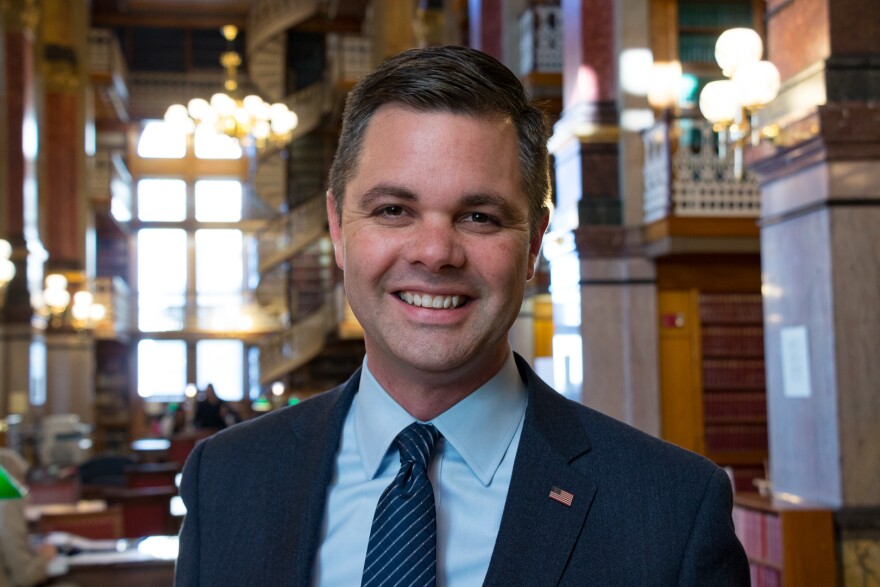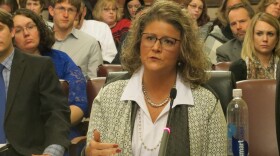There was a spirit of optimism in the air as state lawmakers gaveled in the 2018 session. Opening day often brings talk of bipartisanship and cooperation, but that spirit never seems to last, especially in an election year.
Nevertheless, state Senator Pam Jochum, a Dubuque Democrat, struck a hopeful tone about the coming session, although her party is in the minority in a Senate controlled by Republicans 29 to 20. She says last session they made their voices heard.
"I hope that we're much more transparent and work together to craft tax policy and make a real commitment to what we say are our priorities," she says. "Right now I'm not seeing a lot of outreach to get us trying to work together in subcommittee, but I'll give them the benefit of the doubt."
Minority Whip, Representative Zach Nunn, a Bondurant Republican, also outlined the priorities of the House GOP. He rejects the idea that dissatisfaction with President Donald Trump, whose approval rating hovers around 40-percent, will trickle down to impact legislative races this fall.
"Iowa's voters are pretty educated, I think they'll know what's best for them."

On the Issues
Tax Reform - Jochum is the ranking member of the Senate Ways and Means committee which will oversee any tax reform efforts this session. She says while she supports making Iowa tax policy more competitive, if Republicans were really serious about doing a deep dive into tax reform the committee should've been meeting over the interim. But Senator Randy Feenstra, the Chair of the Ways and Means Committee, has asked for an assessment of the impact of federal tax reform from the Iowa Department of Revenue.
Nunn says federal tax reform has made it important to talk about taxes in Iowa. He says any conversation about taxes also provides an opportunity to re-evaluate the state's income tax rate, which he calls one of the highest in the country, to "make sure we're competitive with our near peers."
When a caller asked how Iowa could avoid the problems created in Kansas when tax cuts were implemented, Nunn says Iowa has a spending problem not a revenue problem.
"In Kansas they cut taxes but continued to increase spending, but here we need to make sure we're spending an appropriate amount."

Mental Health - One group that did meet over the interim was a mental health task force made up of law enforcement, mental health professionals, patients and others. The group has made a list of recommendations for lawmakers to improve the system. Jochum says there's still a lot of work to do. Nunn also identified mental health as one of the most important challenges facing the state. Nunn says funding is critical, but he also praised Iowa Department of Human Services Director Jerry Foxhoven for exploring ways to maximize services by partnering with other agencies.
Racial Profiling - A caller asked what the legislature can do to end racial profiling by law enforcement. A late effort last session did not win approval. Statehouse Correspondent Joyce Russell says Iowa is one of a minority of states that does not specifically ban the practice. It's one of the top legislative priorities of the Iowa Nebraska NAACP.
Bottle Bill - Iowa grocers and beverage distributors have said they plan to renew their push to repeal the bottle bill. This issue raised the concern of one caller who would like to see the bill protected, and expanded to include non-carbonated drinks and a deposit of 10 cents per container. Jochum says when Governor Chet Culver proposed those ideas, the House switchboard was overwhelmed with callers opposing the move.
"We need to keep cool heads and decide whether we want to take Iowa to the next level on recycling," says Jochum.
Medicaid - Nunn says Medicaid is the top issue he hears about from constituents in his district. He says the shift to private, managed care for Medicaid recipients has made the process confusing and difficult to navigate. Nunn says once he gets involved he can usually get a constituent the services they need, but "you shouldn't have to come to your state lawmaker to make [the system] work." He says now that private managed care is in place, lawmakers have a responsibility to make sure it's working correctly, but he urges caution and a thorough assessment.
"Before we start throwing out more money or more solutions before we know what the battle space looks like, there's the potential to make it worse."
Other issues discussed include funding for K-12 education, the IPERS retirement system for public employees, and water quality. Host Ben Kieffer will be joined by Statehouse Correspondent Joyce Russell for a discussion of legislative issues on River to River Mondays during the legislative session.






